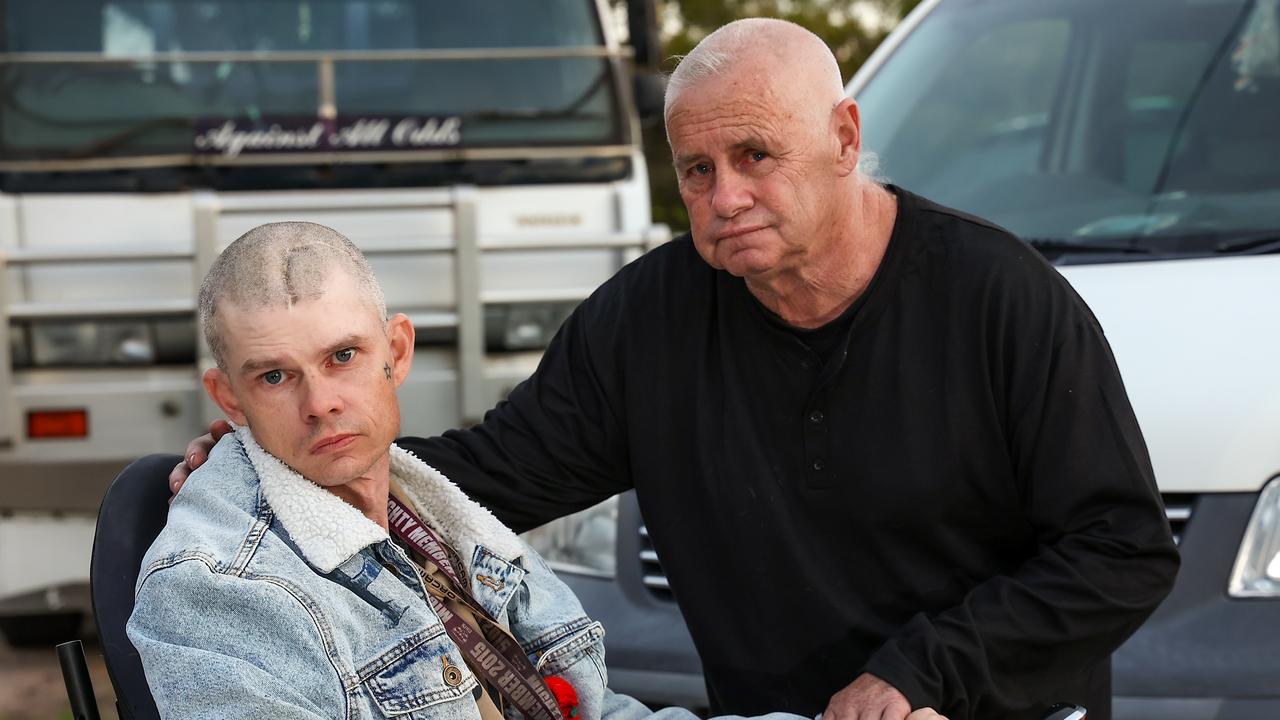Australia needs a national body to protect racehorse welfare
A new national body aimed at protecting the welfare of racehorses has been proposed — but not everyone in the industry is getting behind the move.
Andrew Rule
Don't miss out on the headlines from Andrew Rule. Followed categories will be added to My News.
Sport, like life itself, has good stories and bad, big and small. Last Sunday, a great little story unfolded in a humble horse race on a perfect day at Warrnambool.
One of racing’s many also-rans, the perfectly-named Savvy Acquisition, stormed past the field in the Jericho Cup Consolation to fight a stirring finish with another much-travelled galloper, Seminoles.
Both horses had recently changed hands for a tiny fraction of their original yearling prices. Seminoles, in fact, came to Paul Banks at Torquay from South Australia only four weeks before the Warrnambool race, which his new trainer was confident he could win right up until Savvy Acquisition swooped at the end of the 4km marathon.
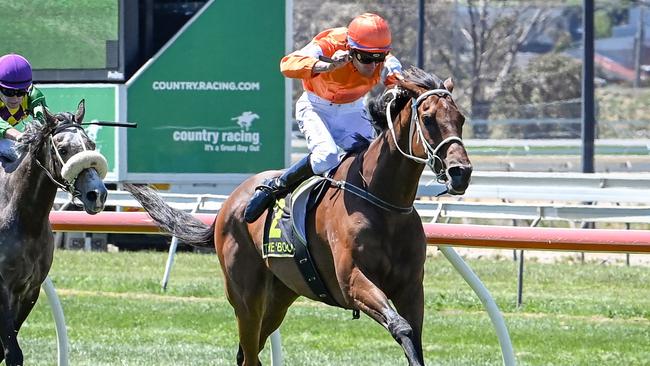
The $33,000 prize meant Savvy Acquisition has earned his one-horse owner Andrew Kelly around $40,000 since he plucked him out of a cheap online sale for $2500 in March.
Savvy buy, indeed. One that guarantees the seven-year-old a paddock for life when he stops racing.
When the Kelly children outgrew pony club, Andrew persuaded his wife Sarina they should switch to a cheap galloper. He then admitted he had one in mind. She now forgives him.
When “Savvy” isn’t doing fast work at Swan Hill racetrack under the keen eye of his trainer, Kelly’s cousin Austy Coffey, the happy owner leads him around, lets him pick grass and looks after him like the family pet he now is.
This might be why the horse has managed 18 runs, including two wins, in the few months since leaving his previous stable in NSW.
Kelly the owner-strapper is a former Mallee farm boy turned country teacher and playwright. He and trainer Coffey are grandsons of a World War I veteran, Martin Patrick Kelly.
For the big man in the battered Akubra hat and bushy beard, to win a race that honours Anzacs (and guarantees a start in next year’s $300,000 Jericho Cup proper) means more than money. But finding a horse who pays his way is certainly a bonus.
The same goes for Seminoles, the horse they beat.
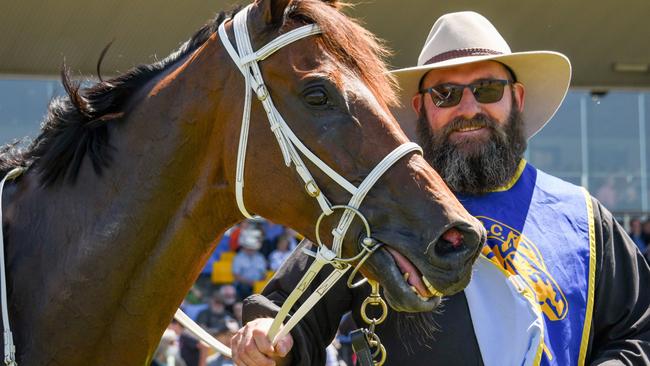
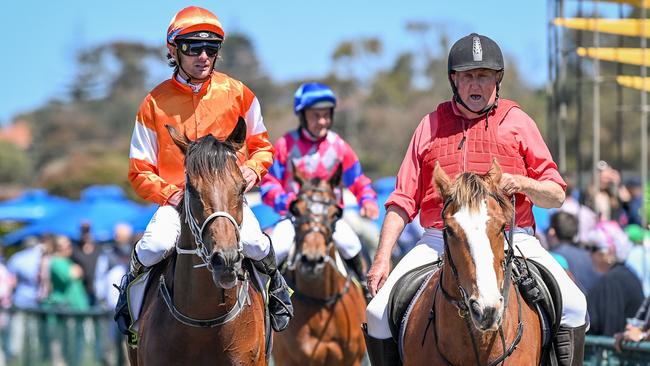
Seminoles has changed hands twice, the last time for $4500, since a city trainer paid $150,000 for him in New Zealand in 2017. If he wins at his next start, or soon after, it will be the sort of happy-ending story that racing needs.
But the reality is that, in racing, fairytale endings are scarce.
It’s true that hundreds of obscure racehorses like Savvy Acquisition have safe futures because they’re owned by horse lovers who can afford them.
But the blunt arithmetic of an industrial-scale sport that produces 16,000 foals a year in Australia and New Zealand means thousands of horses quit the track every year. They can’t all live happily ever after.
Not all are suitable to be hacks — and, besides, there simply aren’t thousands of new homes around.
This is why the national Thoroughbred Breeders Association has spent huge time and effort commissioning a report from a panel led by former Victorian premier Denis Napthine (a veterinary surgeon by trade) and which includes Winx’s trainer Chris Waller, among several other experts.
The report, launched during the week, calls for a new body named Thoroughbred Welfare Australia with an initial $10m budget (raised mostly through a levy on breeders, owners, trainers and jockeys) and the power to make horse welfare uniform across the nation.
Under the plan, breeders would pay $300 for every foal, owners $300 to register a racehorse, and trainers and jockeys 1 per cent of prize money.
Racing Australia would be asked for up to $1.5m. The hope is that sponsorship and donations would top up the budget.
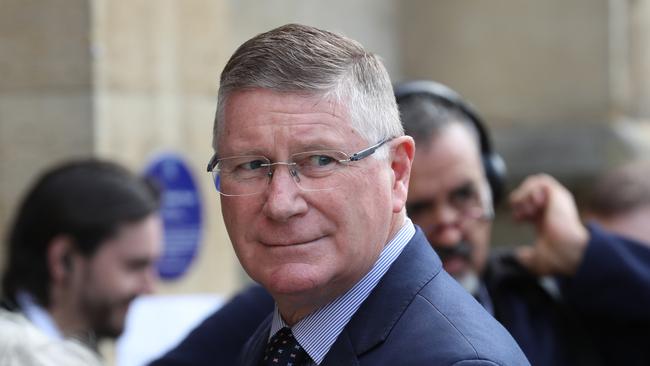
A bunch of stakeholders and interested bystanders will have views on how to raise the money and foot the bills. The hard part, once the funds are raised, is how to help the most possible horses in the best possible ways.
On one side are diehard racing fans who look to the past. On the other are hard line animal liberation activists who fancy feeding their cavoodles on cabbages. In the middle is the general public, increasingly marooned from the natural world in megacities like Melbourne and Sydney.
Otherwise intelligent people can be childishly delusional about our relationship with animals.
The result is an increasingly polarised debate. One side paints the other as cynical, greedy, pro-gambling parasites and apologists for animal cruelty. The latter returns fire by demonising their critics as crazy cat ladies and pinko green vegans.
Despite all the name-calling, there has to be common ground. It’s simply this: humans are responsible for animals that can’t speak for themselves.
That doesn’t mean every animal gets to die of extreme old age and be buried under a headstone next to Grandma. It means that as long as they live, whether that be two decades of retirement or the mere months it takes to fatten chickens, calves and lambs, we owe them a pain-free life and a humane death.
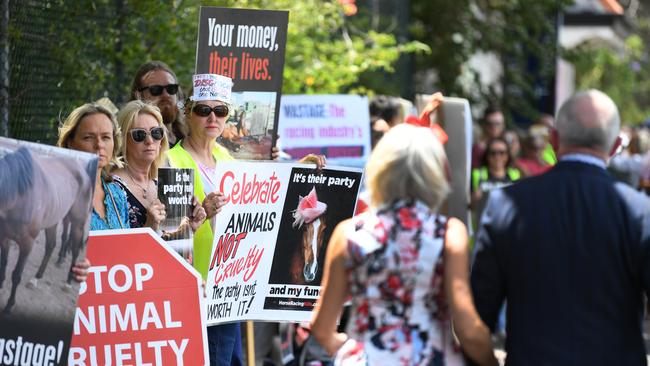
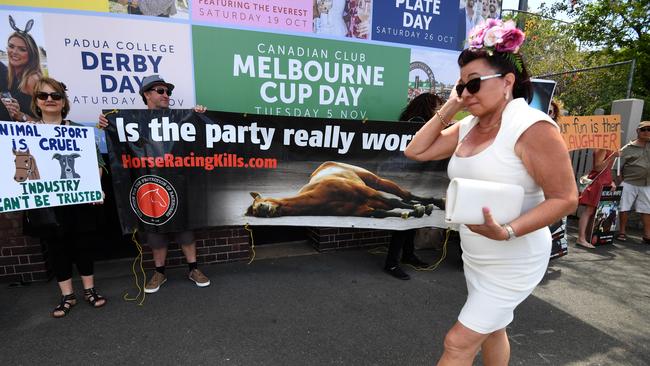
Even the most valuable and famous racehorse is just a horse, one of countless domestic animals that depend on us. Civilised people should treat all animals as well as possible, not just the ones with name tags.
There’s the problem: what does “well as possible” mean?
The people who run racing are grappling with that question as public attitudes are stirred by media “exposure” of abattoirs and knackeries that have actually never been a secret: they have done an unpleasant but necessary job much the same way for centuries before cameras turned up.
The ABC Four Corners program showing ex-racehorses among others being mistreated in a Queensland abattoir in 2019 was a triumph for animal activists who supplied smuggled footage they’d filmed undercover.
There is no point shooting the messenger by debating the elastic ethics of those who make animal snuff movies as propaganda for their pet cause.
As far as racing is concerned, that horse has bolted.
It’s now a case of tackling a public image crisis that has already contributed to the sport shrivelling into irrelevance in the United States.
One problem the new thoroughbred welfare report highlights is the disjointed and mismatched regulations governing horse welfare from state to state in Australia.
Cattle and sheep must be handled according to a national code but horse welfare has fallen through the gap separating farm animals from pets.
So when the NSW racing authorities rashly declared that no thoroughbred would be slaughtered for meat in that state, the likely result was that many unwanted, unused and unusable horses would be trucked gruelling distances to states where they can still be sold, almost inevitably for slaughter. It happens that Victoria’s biggest regular horse sale is at Echuca, on the border.
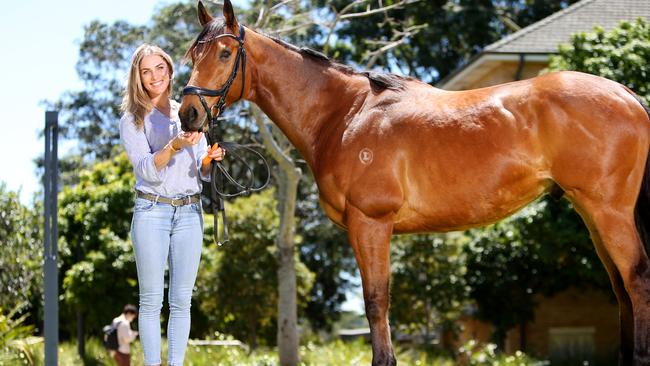
But closing loopholes to enact uniform national regulations about horse welfare, and promoting feel-good publicity campaigns, doesn’t erase the fact there are more unwanted horses than there are permanent homes for them.
And it doesn’t erase the fact that discriminating between the treatment of thoroughbreds and all other horses is a false distinction, legally and logically and ethically.
Thoroughbreds are not owed more dignity or comfort than other domestic animals.
We owe them what we owe every creature: a comfortable life and a pain-free death, whenever that might be.
It’s a simple concept but not everyone wants to grasp it.
Racing Victoria, many weeks after being handed a draft copy of the new report, has not made any meaningful response to proposals that could actually help save their industry from itself.
They seem to hope that if the biggest threat to thoroughbred racing in four centuries is simply ignored, it will go away.
This is not the way to bet.





